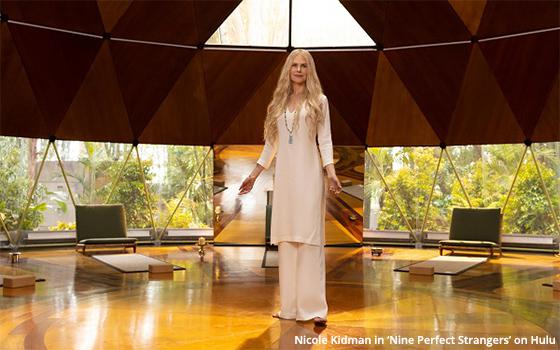
The wellness-spa concept gets taken to
unpredictable extremes in “Nine Perfect Strangers,” a new Hulu drama series that seems tailor-made for our current age of anxiety.
The title can be
taken several ways. Certainly, the nine people who have somehow dragged their emotionally damaged selves to this far-off-the-beaten-path wellness facility called Tranquillum are far from
perfect.
For the most part, they are strangers to each other too. Two of them are a couple, and three of them comprise a family. But even the ones who come connected with
someone else are shown to be strangers to each other and also to themselves.
This eight-part series has this group of people checking into Tranquillum House to
treat a variety of First World problems. Some have to do with processing grief, while others involve coping with career reversals and moving on from busted relationships.
advertisement
advertisement
The nine represent different types of people too, including a bestselling author (played by Melissa McCarthy), a high school teacher (Michael Shannon) who comes with his
wife (Asher Keddie) and their 20-year-old daughter (Grace Van Patten), a wealthy young African-American man (Melvin Gregg) in a yellow Lamborghini who is accompanied by his social media-addicted wife
(Samara Weaving), a temperamental Baby Boomer (Bobby Cannavale) who drives a vintage Mustang, a stay-at-home mom (Regina Hall) and an Englishman (Luke Evans) who appears to be confused about his
sexuality.
The first episode of “Nine Perfect Strangers,” which is adapted from a best-selling novel of the same name by Liane Moriarty, very
effectively sets the scene and defines the characters.
What they are about to experience, however, remains a mystery at the conclusion of Episode One,
although the otherworldly hostess/manager of this facility -- a Russian émigré named Masha (played by series star Nicole Kidman, pictured above) -- gives various oblique hints that the
program these strangers have signed up for will be rigorous indeed.
None of the issues these people are dealing with have anything to do with our real-world
preoccupations with COVID-19, divisive politics, turmoil and unrest both domestic and foreign, and other issues that fill our thoughts and news media.
And yet, this show feels very of the moment because the anxieties and stresses it covers are relatable to so
many. We live in an anxious age. If it was not COVID and climate change, it would be something else.
This
show’s message seems to be: Transformation is hard, and might require drastic action.
Not for nothing, but on this show, the transformation begins with
something that would seem to be deceptively simple, yet very difficult for most of us -- giving up your cell phone.
This column was previously published in Television News
Daily
on August 17, 2021.